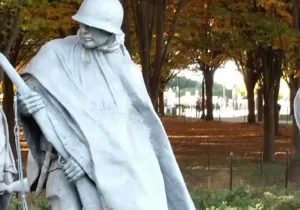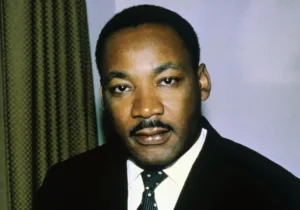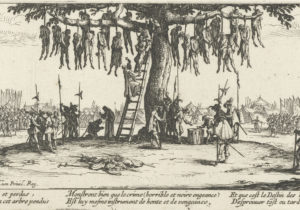American exceptionalism admits of at least two very different histories. On the one hand, you have the early Puritan exceptionalism of moral example articulated by John Winthrop, wherein the Massachusetts Bay Colony was to be as a “city on a hill.” This would develop into a larger vision of the entire United States as a beacon to the world of a just and righteous society. On the other hand, and many years later, Joseph Stalin coined the actual term “American Exceptionalism” to describe a minority view in the Communist Party USA that the United States was not bound to the Marxist historical-economic laws that led to the collapse of capitalism in other countries (for example, because the United States did not go through a feudal period). But whether as a divine vocation or as a historical anomaly, there is broad agreement, especially on the right, that the United States is a very special country.
In many cases, the former view funds an investigation of the latter view. American or Americophile investigators often come to the conclusion that the United States has a national nature distinct from European countries, and this difference in turn spins out a difference in national sentiments. In this narrative, the United States is a nation founded on an idea (usually “liberty”), and the American expression of national sentiment, Patriotism, revolves around love for that idea. By contrast, European nations are founded on “blood and soil” (a sentiment from German Romanticism that crystallized as a Nazi slogan), and the European expression of national sentiment, nationalism, revolves around love for one’s ethnic group and ancestral territory. The core antidote to the horrors of nationalist racism and imperialism, so the story goes, is the chaste virtue of patriotic idealism.
It is with this instrumentalist turn that the problems of this narrative emerge most clearly. For, of course, racism and imperialism reigned in the United States during any conceivable halcyon days of “patriotism,” which were presumably well before any Germans were prattling on about “Blut und Boden.” From the intensification of anti-black policies and spread of black slavery, to the forced expulsion of Native Americans and the manifest destiny imperialism of the Mexican-American War, the ideals of patriotic liberty were often either impotent in preventing or complicit in the very poisoning they were supposed to neutralize.
How can this be?
My hypothesis is that centering the meaning of “nation” exclusively on an idea, even a good idea like “liberty,” leaves a sense of national belonging that is too abstract and, thereby, too weak to overcome the natural forces of prejudice. It allows for a universalizing vision that remains so transcendent that it only touches the earth according to the less savory rules of pure power, often as informed by prejudicial xenophobia. Consequently, even once black people formally become legal equals to white people in the United States, extraordinary sociological differences persist without a clear trajectory of convergence.
That said, doubling down on the opposite, the immanentism of “blood and soil” nationalism, only seems to make these problems much worse.
Instead of absolutizing either scheme, we need to step back and consider what a nation might look like according to biblical norms. In scripture, national life in Israel is understood as a serious vocation to justly develop and celebrate a shared common life (Exodus 23:1-19). The normative unity of the Israelites is a legal unity established by covenant (Exodus 19:5-6), but the national bonds generated by law are nevertheless analogous to familial bonds (Exodus 23:6). From these passages, I want to suggest that instead of either a hyper-transcendent or an over-immanentized view, Christians should seek after an incarnational approach that untwists the perversions in the other two views.
In this incarnational view, the law is about something more powerful than base conditions for individual freedom, though it also secures those. The law is also about generating a real connection between otherwise disconnected parties. This bond, like familial bonds, is a vocational norm for a special kind of love. As such, it has both a transcendent aspect, the moral obligation to love fellow citizens, and an immanent aspect, the actual facts on the ground about whether and how fellow citizens love one another.
This also allows for a more full-bodied assessment of national health. Polling data about confidence in democracy or First Amendment freedoms are important indicators. But in the incarnational view, the practice of Americans being a common people may also be scrutinized. For example, if a common bond of love is key to national health, statistics on interracial marriage, perhaps especially between white and black people, could be critical indicators of national healing from the scourge of racism. If family is indeed the foundation of society, interracial marriages could be more than indicators (and that healing may be further off than we hoped).
This view of incarnational nationhood deepens and overcomes the weakness of nation-as-idea by attaching to a real individual and collective vocation and strengthening legal bonds by analogy to familial bonds. The view nevertheless also breaks the perversion of nation-as-ethnicity by locating the source of national bonds in law, not blood, allowing for a real instead of a nominal significance to immigration and citizenship.
This view may be compatible with some kinds of patriotism and even chastened versions of nationalism. But this compatibility is always tentative and asymmetric. The final rule must flow from norms found in scripture, with connection to preexistent terms as a coalitional accident and pragmatic necessity of language. By ultimately rooting our view of national life to the Bible, we anchor the meaning of nationhood to the second greatest commandment: “you shall love your neighbor as yourself.”
Matthew Arildsen is a prospective MDiv student at Princeton Theological Seminary. He works for the Scala Foundation, a non-profit that promotes the liberal arts. You can reach him at [email protected].







 Sponsor a student for Christianity & National Security 2024
Sponsor a student for Christianity & National Security 2024